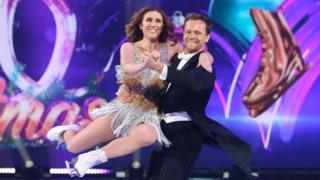
Getty Images
Mark Hanretty partnered Paralympian Libby Clegg in this year’s season of Dancing on Ice
ITV’s Dancing on Ice skater Mark Hanretty has warned the UK risks losing a generation of talent if it does not reopen ice rinks to elite skaters.
A plan to open rinks on 1 August was postponed the day beforehand after a rise in coronavirus infections.
Hanretty said there were “big concerns” the sport could lose people, as most professionals train at public rinks.
Boris Johnson postponed the reopening of ice rinks for two weeks, and listed them among “higher risk settings”.
“Until 15 August at the earliest casinos, bowling alleys, skating rinks and the remaining close contact services must remain closed,” he said.
‘We’re losing a generation’
But while none of those other closures is harming Team GB’s future Olympic hopes, the ongoing closure of ice rinks potentially does.
Because ice rinks are not something that even the richest athletes can feasibly have at home, many skaters – including those at the top of the sport – routinely train at public rinks.
In some cases, they make special arrangements to use the rinks before or after they are open to the public.
But these sessions are not available when the rinks are closed to everyone, with no exceptions.
Hanretty said this meant the UK was at risk of falling behind other countries at an elite level, and that any further delay could jeopardise the country’s chances at next year’s World Championships.
Hanretty himself won two bronze medals as a pairs skater in the British Championships, and competed at the European and World Championships, before being selected to join the Dancing On Ice team as one of the show’s professional skaters.
He and his wife Kathy are also ice skating coaches and he said: “Like many coaches around the country, we’re trying to scramble to keep skaters going, We’ve been without ice rinks now for five months.
“For the competitive elite skaters, it really separates us from the rest of the world now. If we’re waiting until September until we can train, it’s going to be hard for any British elite competitors to compete. We’re losing a generation.”
The feeling has been echoed on social media, with the hashtag #OverlookedOlympicSport being shared by figure skaters online.
British Ice Skating, the national governing body for ice skating in the UK, said the postponement “disappointed not only British Ice Skating, but all those that were due to reopen this weekend”.
Zoe Briggs is one such competitor who is struggling with being unable to skate.
“I get up at 4am to train every morning, and train after school from 4pm to 8pm,” the 14-year-old told the BBC. “It’s what I’ve grown up for years on end doing. It’s been so different not doing that, it’s so hard.”
Zoe said she has been continuing her training via Zoom, but it is limited in how much it can help at her level.
“It’s worrying because skating is all about muscle memory, letting you jump and glide across the ice. I’m worried not doing that will make the muscle memory disappear.”
Image copyright
Zoe Briggs
Zoe was training at the Bracknell Ice Rink before the pandemic
“I’ve been working a lot on my fitness and my stamina and my flexibility, and we’ve been doing Zoom meetings with our coaches for hours every day to try and keep it up.
“But it’s really affected me mentally. We were told we were able to go back in July but that was pushed back and now we don’t know. When I found out the news, I was crying for hours because I just want to get on with skating.”
John Hamer is a three-time British national champion figure skater and a skating coach in London. He explained that rinks remaining closed have had a lasting impact on more than just the students.
“Most coaches are self-employed,” he said. “And financially it’s not been easy, to say the least. I had to ask my dad for money.
“I’ve lost five or six people for sure that I know aren’t coming back – one of them was very competitive. They were there two, three, four times a week having multiple lessons. That probably accounts for a good 20-25% of my competitive business that I know isn’t coming back.”
He said there was “no reason” ice rinks should remain shut for athletes, particularly when other venues such as swimming pools have been reopened.
“I don’t think the government realises how big a deal ice skating is to the nation,” he said. “It’s like the unsung sport of the country.”
He added: “I honestly don’t think you can find a safer sporting venue. If they don’t get us back fast, there will be a generation of potential Olympic kids that we have missed out on.”